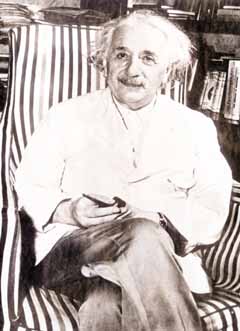Every year the Hebrew University receives about a million dollars for its rights to Albert Einstein's intellectual property. Spielberg's new film, "Artificial Intelligence", also contributes to the income
by Debbie Kaufman

Above: Albert Einstein. Below: Spielberg during the filming of his film
The guests who came to the pre-premiere screening of Steven Spielberg's new film, "Artificial Intelligence", held last week, were not the usual screening audience of film critics and famous personalities who help with their presence to promote a film. Each of the invitees was asked to deposit a total of NIS 150 into the coffers of the Hebrew University in Jerusalem, which sponsored the screening. The money is intended for scholarships to be awarded to outstanding students.
The explanation for the unusual nature of this pre-premiere screening lies in the fact that the Hebrew University owns part of the rights to Spielberg's film, because the character of Albert Einstein is mentioned in it. The Hebrew University is the sole holder of the rights to use Einstein's name and likeness for commercial purposes. In his will, Einstein ordered that a significant part of his property, which includes written material, copyrights and his intellectual property, be transferred to her. Among other things, this property includes the right to preserve the name and likeness of the drafter of the theory of relativity - to the best of the university's understanding

and for achieving its goals.
The connection between Einstein and the Hebrew University preceded its official establishment in 25. The vice president and CEO of the university, Moshe Vigdor, says that until his death in 55, Einstein helped the university in all phases of its establishment, including fundraising. He even gave the first scientific lecture held there - on the theory of general relativity. In exchange for the royalties it receives, amounting to more than a million dollars a year, the university manages activities related to the preservation of Einstein's legacy and its advancement. Thus, she established the Albert Einstein Archive, where most of his working papers, research works - including an original manuscript of the theory of relativity and quantum theory - are kept, as well as the Nobel Prize in Physics certificate he received in 1921, which contains the famous formula of the theory of relativity. His personal belongings, such as a cloak, glasses and private letters, are also kept in the archive. In addition, the university received part of the rights to his home in Germany, where it holds the Einstein Forum once a year.
Although "Artificial Intelligence", which describes a futuristic world of human-like robots and raises questions about the boundary between robotic engineering and emotional programming, uses the character of Einstein in only minor references, the film's creator, Spielberg, also had to pay royalties to the Hebrew University for this right. According to Vigdor, following a request that Spielberg submitted to the university about a year and a half ago, to use the character of Einstein, and after an examination in which it was found that the film does not harm her, the university gave its consent to this.
In order to determine its position and understand its rights in this area, the university turned to an American agency specializing in personal rights in the early 80s. This agency manages the negotiations for the university on the use of Einstein's name or products and also represents it in lawsuits it files for unauthorized use of them.
Thus, a year ago, Pepsi was given permission to use the name "Einstein" in a commercial video it produced. Alternatively, a liquor company that asked to release vodka under the brand name "Einstein" was denied. According to Vigdor, the university even filed a lawsuit for unauthorized use of his name. "An American bagels chain called 'Einstein' Bagels after the owner whose name is Einstein, was sued for using the physicist's image as well. We won the trial, and the owner of the network had to pay royalties to the university."
Even during the preparation of the film, the university was not involved in its production and did not give its opinion to the messages it would convey when it was released, regarding the possibility of producing a human-like creature, with independent feelings and thoughts, and the controversy that would arise in the public as a result of this, because by virtue of its possession of the copyrights to it, it is identified with these messages. However, today the university is aware of the heated debate that arose following the film. "It is true that the subject is controversial and the film raises fundamental problems, especially in this period, when the world deals with genetic engineering and the human genome," Vigdor says. "However, at the university itself, issues of this type come up for discussion every day."
